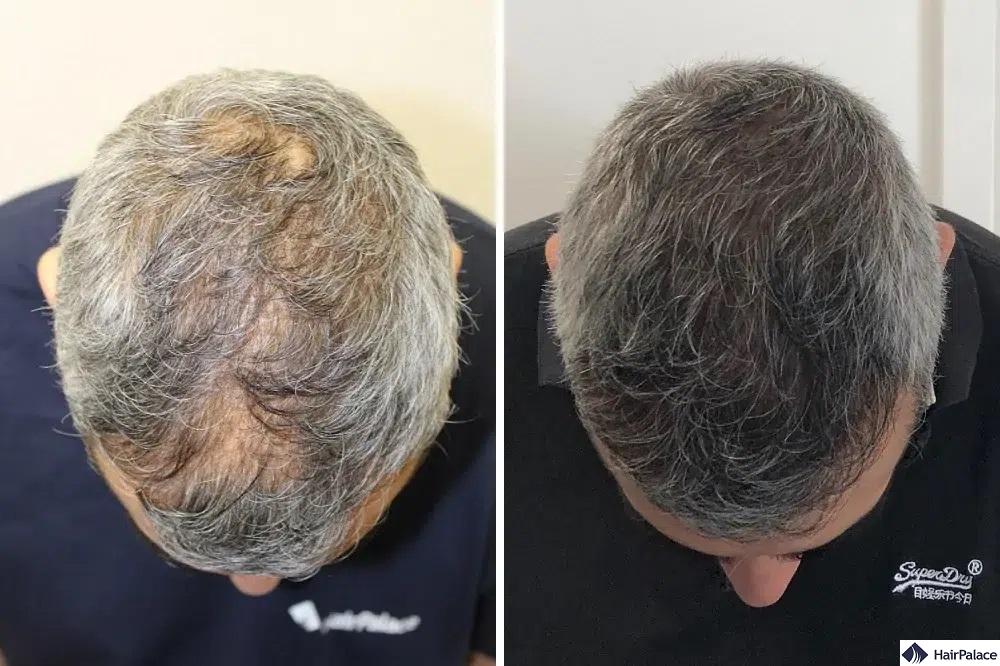What to Avoid When Getting a Turkish Hair Transplant

Turkey has become one of the most popular destinations for hair transplant surgery, attracting thousands of patients each year with its affordable prices and skilled surgeons.
While many people achieve excellent results, there are risks associated with choosing the wrong clinic or failing to do proper research.
Not all clinics operate with the same expertise and safety standards, and a rushed or poorly performed procedure can lead to serious complications.
In this article, we’ll highlight the most common mistakes people make when undergoing a hair transplant in Turkey and share essential tips to help you avoid them.
- Why is Turkey so popular?
- Turkey hair transplant risks
- What to watch out for
- Should you get a hair transplant in Turkey or Hungary?
Why is Turkey a popular hair transplant destination?

Turkish hair transplant clinics have become a leading destination for hair restoration surgery due to the combination of affordability, and experienced surgeons.
The country offers significantly lower hair transplant costs than Western Europe and North America, often at a fraction of the cost.
Many clinics in Turkey use the latest hair restoration techniques, such as Follicular Unit Extraction (FUE) and Direct Hair Implantation (DHI), and employ highly skilled surgeons with years of experience.
The convenience of all-inclusive packages, which often cover accommodation, transportation, and post-procedure care, further attracts medical tourism.
Istanbul, in particular, has established itself as a global hub for hair transplants, drawing thousands of patients annually who seek cost-effective hair transplant solutions.
What are the risks of getting a hair transplant in Turkey?
While Turkey is a popular destination for hair transplants, there are risks associated with the procedure, especially when patients choose low-cost clinics without proper research.
One of the primary concerns is the presence of unlicensed or inexperienced practitioners operating in unregulated clinics, which can lead to poor results, infections, or even permanent scarring.
Additionally, some clinics may not adhere to strict hygiene and safety standards, increasing the risk of complications such as excessive bleeding, nerve damage, or graft failure.
Language barriers can also pose challenges in communication, potentially leading to misunderstandings about the procedure and post-operative care.
Another risk is the aggressive marketing tactics used by some clinics, offering unrealistic promises or rushed procedures without proper patient evaluation.
To reduce these risks, patients should carefully research clinics, confirm their credentials, read patient reviews, and choose a qualified, experienced medical team for their procedure.
Turkish hair transplant red flag

Unrealistic promises
Low-cost hair transplant clinics that promise unrealistic results, such as extracting “unlimited grafts” or up to 5000 grafts in one sitting, should raise red flags for several reasons.
First, reputable surgeons carefully plan to ensure the donor area is not overharvested.
Excessive extraction can cause permanent thinning, scarring, or an unnatural appearance in both the donor and recipient areas.
Taking out too many grafts in one go risks trauma to the scalp, reducing the survival rate of the transplanted follicles.
These Turkish “hair mills” prioritise profit over patient care, potentially using untrained technicians instead of licensed doctors, performing rushed procedures, or cutting corners in hygiene and technique.
A well-planned hair transplant focuses on natural-looking density, donor preservation, and proper recovery, rather than exaggerated numbers.
If a clinic makes bold promises without evaluating your scalp health and donor supply, it’s a warning sign to look elsewhere and seek a trustworthy, qualified surgeon.
Cheap offers
Suspiciously cheap hair transplant offers from Turkish clinics often come with hidden risks that could compromise both the results and patient safety.
Many of these low-cost clinics cut corners by employing unqualified or inexperienced staff who may lack proper medical training.
Some operate in unregulated environments, failing to meet hygiene and safety standards, which increases the risk of infections, scarring, and bad hair transplant results.
In some cases, the advertised price may not include essential aftercare, hidden fees, or proper follow-up, leaving patients without necessary post-operative support.
While affordability is one of Turkey’s main attractions for hair transplants, extremely low prices should be a red flag.
Not knowing who will operate you

One of the biggest mistakes patients make when getting a hair transplant in Turkey is not knowing exactly who will perform the procedure.
Some clinics advertise the expertise of renowned surgeons, but in reality, most (or even all) of the procedure is handled by unlicensed technicians rather than qualified doctors.
While trained medical assistants can play a role in the process, only a skilled and experienced surgeon should be touching your head.
A qualified hair transplant surgeon should be the one designing your hairline, extracting grafts, and ensuring precise implantation for natural-looking results.
If they refuse to share the clinic’s accreditation, or only guarantee a doctor’s presence without confirming their active involvement, consider it a major red flag.
A reputable clinic will be transparent about who will handle your procedure and will ensure you are in safe, professional hands.
Aggressive sales tactics
If a clinic uses aggressive or high-pressure sales tactics to push you into booking a hair transplant, it’s a big warning sign.
Reputable clinics focus on patient care and long-term results rather than quick sales.
However, some cheap clinics use tactics such as limited-time discounts, urgent booking pressures, or exaggerated success guarantees to lure in patients.
They may also gloss over potential risks, downplay recovery time, or promise unrealistic results just to close the deal.
A trustworthy clinic will give you ample time to make an informed decision, provide detailed consultations, and ensure you understand the entire procedure, including possible risks.
If a clinic seems more interested in securing your payment than addressing your concerns, it’s best to walk away and find a professional, patient-focused provider.
No mention of long-term outcomes

Clinics should prioritize long-term results, not just immediate post-surgery appearances.
If a clinic fails to discuss how your hair will look in the coming years, it’s a sign that they may not be considering factors like future hair loss, graft survival rates, or natural-looking density.
Some clinics focus on short-term cosmetic improvements, but without proper planning, the results may not age well, leading to patchy growth, and unnatural hairlines.
Licensed surgeons working at reputable clinics will always be open to showing you photos of previous patients so you can see the long-term outcomes of their work.
Additionally, experienced surgeons will discuss how to maintain your results, including potential corrective procedures, and realistic expectations based on your hair type and donor capacity.
If a clinic avoids these discussions or focuses solely on the immediate post-surgery appearance, it likely prioritizes quick sales over achieving a successful, long-lasting result.
Accepting every patient
A reputable hair transplant clinic carefully evaluates each patient to determine if they are a good candidate for the procedure.
However, some low-quality clinics accept every patient without proper assessment, treating hair transplants like a one-size-fits-all service.
This “hair mill” approach prioritizes volume and profit, leading to poor results, overharvesting, and long-term complications.
Not everyone is a suitable candidate for a hair transplant, factors like donor hair availability, ongoing hair loss patterns, scalp health, and realistic expectations must be considered.
Accredited clinics conduct thorough consultations, explain alternative treatments if necessary, and only proceed with surgery when it’s medically appropriate.
If a clinic is eager to book your procedure without evaluating your hair loss progression or discussing long-term planning, it’s a red flag.
Always choose a clinic that values personalized care, and patient satisfaction over high patient turnover to ensure the best possible outcome.
Immediate availabilities

While quick scheduling may seem convenient, immediate availability for a hair transplant can be a warning sign.
High-quality clinics with experienced medical professionals typically have a waiting list, as they take the time to assess each patient, plan procedures carefully, and avoid overbooking.
If a clinic can offer you a next-day or same-week appointment without proper consultation, it suggests they are more focused on high patient turnover rather than quality results.
Reputable clinics prioritize thorough pre-operative assessments, ensuring that the procedure is appropriate for your hair loss stage, donor capacity, and long-term hair restoration goals.
On the other hand, low-quality clinics operating as hair transplant factories often rush patients into surgery without detailed evaluations, increasing the risk of complications.
Avoid clinics that rush you into scheduling your hair transplant without a free consultation and proper medical review of your long-term hair restoration plan.
Instead, look for a clinic that prioritizes patient care, proper planning, and realistic expectations over rapid booking to ensure a successful hair transplant.
Giving a quote without examination

Clinics should provide a personalized treatment plan after thoroughly examining your hair loss pattern, scalp condition, and donor area availability.
If a clinic gives you a fixed-price quote without assessing your case, it’s a warning sign that it may be operating on a one-size-fits-all approach.
Clinics that offer instant quotes without seeing photos or conducting a consultation are often more focused on high patient turnover than on quality results.
A professional clinic will insist on a detailed evaluation, either in person or through a video consultation, before providing a quote.
This ensures that the procedure is appropriate for you and that expectations are realistic.
If a clinic pushes a price on you without any medical assessment, be cautious—it could mean hidden costs, rushed procedures, or poor-quality results.
Not listening to your needs
A professional and patient-focused hair transplant clinic should listen to your concerns, understand your expectations, and tailor the procedure to your needs.
If a clinic dominates the conversation, dismisses your questions, or prioritizes its agenda over your concerns, consider it a red flag.
Each patient’s hair loss journey is unique, and a successful transplant requires careful planning based on your goals, hair type, donor availability, and future hair loss potential.
A clinic that rushes through consultations ignores your input, or offers a generic treatment plan without customization is unlikely to provide the best outcome.
Reputable surgeons take the time to explain the procedure, answer all your questions, discuss realistic expectations, and ensure you are fully comfortable with the process before moving forward.
Little to no reviews
A hair transplant is a life-changing procedure, and reputable clinics should have a track record of satisfied patients.
If a clinic has few or no reviews, it’s a warning sign that they may lack experience, have a poor reputation, or even be a newly established, untested operation.
In contrast, well-established clinics typically have hundreds of verified reviews, testimonials, and before-and-after photos from real patients.
Even more concerning is when a clinic has only overly positive, generic reviews with no details about the patient experience—this could indicate fake reviews rather than genuine feedback.
A good clinic will have a mix of detailed positive reviews and constructive criticism, reflecting honest patient experiences.
Before choosing a clinic, always check Google Reviews, Trustpilot, Trustindex, or hair transplant forums to see what past patients have said.
If a clinic has little online presence or hides patient feedback, it’s best to be cautious and look for a more transparent and well-reviewed hair transplant provider.
Brand new clinic
Choosing a brand new clinic for a hair transplant can be risky, as it often means a lack of proven results, limited patient reviews, and untested medical staff.
Hair transplantation is a highly specialized procedure that requires years of experience to perfect, and newer clinics don’t have the expertise or track record to ensure high-quality outcomes.
Additionally, many low-cost, inexperienced clinics open and close quickly, making warranty guarantees, follow-up care, and accountability questionable.
If medical complications arise after the procedure, you may struggle to get the necessary post-operative support or corrective treatment.
While a new clinic isn’t always a bad option, it’s essential to verify the credentials of the medical team and look for patient testimonials or real case studies.
Without these reassurances, you might be taking a significant gamble on the quality and longevity of your hair transplant results.
Should you get a hair transplant in Turkey or Hungary?

Turkey is the world’s most popular destination for hair transplants.
However, as we’ve discussed, there are several Turkey hair transplant red flags to be aware of, and undergoing a procedure at a Turkish clinic comes with potential risks.
Hungary, on the other hand, offers an excellent, risk-free alternative.
As a member of the European Union, Hungarian clinics follow strict EU-wide health regulations and hygiene protocols, ensuring the highest standards of safety and care.
HairPalace has been at the forefront of hair transplantation in Hungary for over a decade.
Our internationally acclaimed clinic provides the same competitive prices as Turkish clinics but in a much safer medical environment with significantly lower risks of complications.
Patients can save up to 70% compared to UK clinics while enjoying world-class treatment without compromising on quality.
Additionally, you can combine your procedure with a relaxing stay in Budapest, one of Europe’s most stunning capital cities.
Take the first step toward restoring your confidence, get in touch with our team today!
Last medically reviewed on March 25th, 2025
- ISHRS: 2022 Practice Census Resultshttps://ishrs.org/wp-content/uploads/2022/04/Report-2022-ISHRS-Practice-Census_04-19-22-FINAL.pdf
- Vogel James E et al. Hair Restoration Surgery: The State of the Art. Aesthetic Surgery Journal 2013;1:33http://dx.doi.org/10.1177/1090820X12468314
- Zito PM, Raggio BS. Hair Transplantation. Updated 2021https://www.ncbi.nlm.nih.gov/books/NBK547740/
- Nadimi S. Complications with Hair Transplantation. Facial Plast Surg Clin North Am. 2020 May;28(2):225-235. doi: 10.1016/j.fsc.2020.01.003. PMID: 32312509.https://pubmed.ncbi.nlm.nih.gov/32312509/
- Garg AK, Garg S. Complications of Hair Transplant Procedures-Causes and Management. Indian J Plast Surg. 2021 Dec 31;54(4):477-482. doi: 10.1055/s-0041-1739255. PMID: 34984088; PMCID: PMC8719980.https://pubmed.ncbi.nlm.nih.gov/34984088/
- Stough DB. The Progressive Loss Risk Scale for Hair Restoration Surgery. Dermatol Surg. 2022 Jul 1;48(7):726-729. doi: 10.1097/DSS.0000000000003453. Epub 2022 Apr 12. PMID: 35412482.https://pubmed.ncbi.nlm.nih.gov/35412482/


